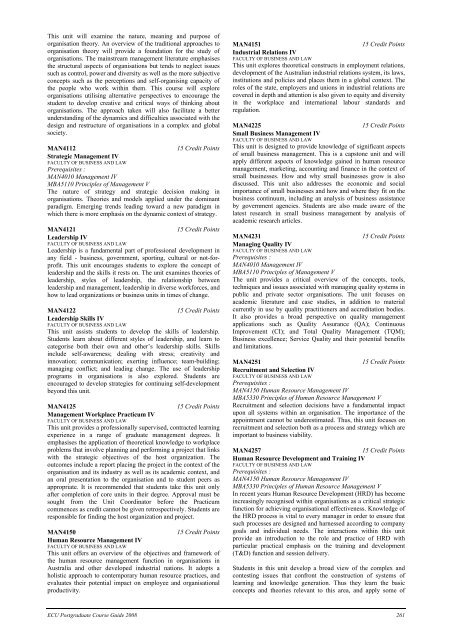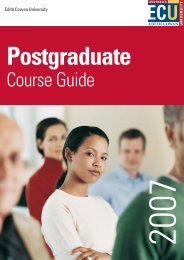Postgraduate - Edith Cowan University
Postgraduate - Edith Cowan University
Postgraduate - Edith Cowan University
Create successful ePaper yourself
Turn your PDF publications into a flip-book with our unique Google optimized e-Paper software.
This unit will examine the nature, meaning and purpose of<br />
organisation theory. An overview of the traditional approaches to<br />
organisation theory will provide a foundation for the study of<br />
organisations. The mainstream management literature emphasises<br />
the structural aspects of organisations but tends to neglect issues<br />
such as control, power and diversity as well as the more subjective<br />
concepts such as the perceptions and self-organising capacity of<br />
the people who work within them. This course will explore<br />
organisations utilising alternative perspectives to encourage the<br />
student to develop creative and critical ways of thinking about<br />
organisations. The approach taken will also facilitate a better<br />
understanding of the dynamics and difficulties associated with the<br />
design and restructure of organisations in a complex and global<br />
society.<br />
MAN4112 15 Credit Points<br />
Strategic Management IV<br />
FACULTY OF BUSINESS AND LAW<br />
Prerequisites :<br />
MAN4010 Management IV<br />
MBA5110 Principles of Management V<br />
The nature of strategy and strategic decision making in<br />
organisations. Theories and models applied under the dominant<br />
paradigm. Emerging trends leading toward a new paradigm in<br />
which there is more emphasis on the dynamic context of strategy.<br />
MAN4121 15 Credit Points<br />
Leadership IV<br />
FACULTY OF BUSINESS AND LAW<br />
Leadership is a fundamental part of professional development in<br />
any field - business, government, sporting, cultural or not-forprofit.<br />
This unit encourages students to explore the concept of<br />
leadership and the skills it rests on. The unit examines theories of<br />
leadership, styles of leadership, the relationship between<br />
leadership and management, leadership in diverse workforces, and<br />
how to lead organizations or business units in times of change.<br />
MAN4122 15 Credit Points<br />
Leadership Skills IV<br />
FACULTY OF BUSINESS AND LAW<br />
This unit assists students to develop the skills of leadership.<br />
Students learn about different styles of leadership, and learn to<br />
categorise both their own and other’s leadership skills. Skills<br />
include self-awareness; dealing with stress; creativity and<br />
innovation; communication; exerting influence; team-building;<br />
managing conflict; and leading change. The use of leadership<br />
programs in organisations is also explored. Students are<br />
encouraged to develop strategies for continuing self-development<br />
beyond this unit.<br />
MAN4125 15 Credit Points<br />
Management Workplace Practicum IV<br />
FACULTY OF BUSINESS AND LAW<br />
This unit provides a professionally supervised, contracted learning<br />
experience in a range of graduate management degrees. It<br />
emphasises the application of theoretical knowledge to workplace<br />
problems that involve planning and performing a project that links<br />
with the strategic objectives of the host organization. The<br />
outcomes include a report placing the project in the context of the<br />
organisation and its industry as well as its academic context, and<br />
an oral presentation to the organisation and to student peers as<br />
appropriate. It is recommended that students take this unit only<br />
after completion of core units in their degree. Approval must be<br />
sought from the Unit Coordinator before the Practicum<br />
commences as credit cannot be given retrospectively. Students are<br />
responsible for finding the host organization and project.<br />
MAN4150 15 Credit Points<br />
Human Resource Management IV<br />
FACULTY OF BUSINESS AND LAW<br />
This unit offers an overview of the objectives and framework of<br />
the human resource management function in organisations in<br />
Australia and other developed industrial nations. It adopts a<br />
holistic approach to contemporary human resource practices, and<br />
evaluates their potential impact on employee and organisational<br />
productivity.<br />
MAN4151 15 Credit Points<br />
Industrial Relations IV<br />
FACULTY OF BUSINESS AND LAW<br />
This unit explores theoretical constructs in employment relations,<br />
development of the Australian industrial relations system, its laws,<br />
institutions and policies and places them in a global context. The<br />
roles of the state, employers and unions in industrial relations are<br />
covered in depth and attention is also given to equity and diversity<br />
in the workplace and international labour standards and<br />
regulation.<br />
MAN4225 15 Credit Points<br />
Small Business Management IV<br />
FACULTY OF BUSINESS AND LAW<br />
This unit is designed to provide knowledge of significant aspects<br />
of small business management. This is a capstone unit and will<br />
apply different aspects of knowledge gained in human resource<br />
management, marketing, accounting and finance in the context of<br />
small businesses. How and why small businesses grow is also<br />
discussed. This unit also addresses the economic and social<br />
importance of small businesses and how and where they fit on the<br />
business continuum, including an analysis of business assistance<br />
by government agencies. Students are also made aware of the<br />
latest research in small business management by analysis of<br />
academic research articles.<br />
MAN4231 15 Credit Points<br />
Managing Quality IV<br />
FACULTY OF BUSINESS AND LAW<br />
Prerequisites :<br />
MAN4010 Management IV<br />
MBA5110 Principles of Management V<br />
The unit provides a critical overview of the concepts, tools,<br />
techniques and issues associated with managing quality systems in<br />
public and private sector organisations. The unit focuses on<br />
academic literature and case studies, in addition to material<br />
currently in use by quality practitioners and accreditation bodies.<br />
It also provides a broad perspective on quality management<br />
applications such as Quality Assurance (QA); Continuous<br />
Improvement (CI); and Total Quality Management (TQM);<br />
Business excellence; Service Quality and their potential benefits<br />
and limitations.<br />
MAN4251 15 Credit Points<br />
Recruitment and Selection IV<br />
FACULTY OF BUSINESS AND LAW<br />
Prerequisites :<br />
MAN4150 Human Resource Management IV<br />
MBA5330 Principles of Human Resource Management V<br />
Recruitment and selection decisions have a fundamental impact<br />
upon all systems within an organisation. The importance of the<br />
appointment cannot be underestimated. Thus, this unit focuses on<br />
recruitment and selection both as a process and strategy which are<br />
important to business viability.<br />
MAN4257 15 Credit Points<br />
Human Resource Development and Training IV<br />
FACULTY OF BUSINESS AND LAW<br />
Prerequisites :<br />
MAN4150 Human Resource Management IV<br />
MBA5330 Principles of Human Resource Management V<br />
In recent years Human Resource Development (HRD) has become<br />
increasingly recognised within organisations as a critical strategic<br />
function for achieving organisational effectiveness. Knowledge of<br />
the HRD process is vital to every manager in order to ensure that<br />
such processes are designed and harnessed according to company<br />
goals and individual needs. The interactions within this unit<br />
provide an introduction to the role and practice of HRD with<br />
particular practical emphasis on the training and development<br />
(T&D) function and session delivery.<br />
Students in this unit develop a broad view of the complex and<br />
contesting issues that confront the construction of systems of<br />
learning and knowledge generation. Thus they learn the basic<br />
concepts and theories relevant to this area, and apply some of<br />
ECU <strong>Postgraduate</strong> Course Guide 2008 261



